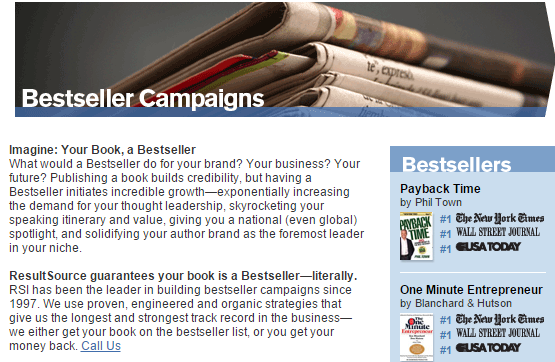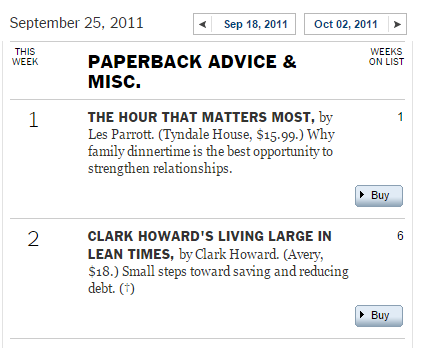This morning, the Daily Beast published my article summarizing recent material I have obtained.
There is still more to develop on this story. For instance, it appears that the web of relationships involving Sealy Yates, Kevin Small, David Jeremiah and the Parrotts is longstanding. I hope to develop that part of the story more this coming week. As I pointed out in the post earlier this afternoon, Driscoll was a late comer to the party and an outsider to the club. Small is on the board of the Parrotts’ non-profit and Yates is on the board of Jeremiah’s Turning Point. Jeremiah credited Small’s publishing genius as far back as 2006.
It is hard to say if these folks will open up and reveal how all of this works.
Whether or not they do may depend on how much more media scrutiny develops. Christianity Today had a small blurb Friday linking to my blog posts. I think other stories are coming.
What I would like to see is a straightforward explanation from the agents, consultants, authors and publishers about the way they work the New York Times system. In the case of Driscoll’s contract, deception was involved. Has that occurred for the other authors? It appears that way but perhaps the agents, consultants, authors and publishers do not believe they are being deceptive. I would like to hear their side of it. Thus far, outside of a promise of a reply that didn’t come from Tyndale House, there have been no replies from those who have engaged in the best-seller campaigns.
When Mark Driscoll used this approach, his critics and the media were all over the story. Where are they now?
Yates and Yates have a significant cadre of authors they represent. Do all of them use ResultSource? I asked two of them but received no answer.
More broadly, I think the NYT Bestseller brand is tarnished by the actions of ResultSource. I asked the NYTs if they planned any kind of correction for those books proven to benefit from gaming the system, and the paper declined to comment.
On WORD-FM (Pittsburgh) last week, I was interviewed by Kathy Emmons. Her suggestion to the NYTs was to permanently ban any author caught cheating.
Clearly, this is a problem larger than evangelical authors but it appears that it would take evangelicals to change course given that some on the inside of this are within the camp.
Tag: Sealy Yates
Hey Christian Author: What Would a Bestseller Do For Your Brand?
Les and Leslie Parrott are evangelical Seattle-based authors who specialize in marriage and relationship issues. They have written numerous books, some of which have made it to the New York Times Bestseller List. At least one of those books played a short, peripheral role in the drama that has been Mark Driscoll over the last couple of years. Let me explain.
The Parrotts, like David Jeremiah (who I wrote about yesterday), have worked with Kevin Small, the CEO of ResultSource, in their publishing business. One of things ResultSource does is to conduct Bestseller Campaigns. In such a campaign, they literally guarantee an author that a book with show up on the New York Times Bestseller List or the consulting fee is refunded (see Mark Driscoll and Mars Hill’s contract with ResultSource).

When Mark Driscoll’s literary agent Sealy Yates wanted to set up meetings at Mars Hill to work out the logistics behind the 2011-2012 Real Marriage bestseller campaign, he encouraged the Mars Hill troops by telling them of another successful bestseller campaign just conducted in September 2011. The excerpt below is from a Mars Hill communication from agent Sealy Yates:

In other words Mars Hill Church: see what you have to look forward to by working with “Kevin and his company.”
The Parrotts’ book did indeed make #1 on the New York Times Bestseller List during the week of September 25, 2011.

As sometimes happens with a campaign that games the system, the next week the book fell off the chart. ResultSource uses their many accounts to buy up books during a concentrated period of time. After that, if the book doesn’t continue selling, it drops off the chart.
The Parrotts have referred to Kevin Small as a part of their team and chair of their non-profit organization in previous books. I wrote the Parrotts last week and asked for comment. I also asked publisher of The Hour That Matters Most, Tyndale House, for comment about their part in the scheme. Initially, Tyndale House spokesman Todd Starowitz said last week he would have a comment for me, but nothing has come this week. I have written Sealy Yates and Kevin Small as well with no reply.
I also wrote the New York Times Bestseller List for comment. I wondered if they discovered that religious authors often manipulated sales figures. Danielle Rhoades-Ha, Director of Communications for the New York Times, replied that authors of many types of books engage in such tactics, and explained that “attempts to manipulate our rankings with falsified sales or strategic orchestrated schemes often through legitimate bookstores are by no means limited to books that offer religious and spiritual guidance.”
According to Rhoades-Ha, companies like ResultSource are on the Times’ radar:
In response, we have developed a system to detect anomalies and patterns that are typical of attempts to gain a false ranking and warrant further inquiry. We know which publishers are the most likely to attempt such things. We know what tools they use and with whom — which organizations, special interest web sites, “consultants” and shady order fulfillment houses and retailers — they tend to collaborate.
Given the language used by Ms. Rhoades-Ha, I don’t think the Times approves of these schemes:
Pirate plots abound wherever books can be purchased in bulk through affiliated organizational or corporate funds, churches or political action committees. Other red flags include large anonymous online bulk sales and e-book sales (which do not require traditional inventory accountability) and events and conferences that “give out” books but actually record the book sales as part of the ticket price.
She said that the Times reserves the right to keep titles off the list if they don’t meet their standards and they use a dagger symbol “as a signal to readers that the book attains its ranking largely but not exclusively from bulk purchases.” She added that they attempt to spot those who try to manipulate their rankings.
Tomorrow I examine the ethics of manipulating books sales. I have comments from a Christian publisher and various views on the subject.